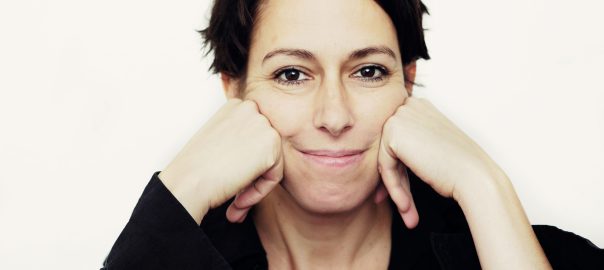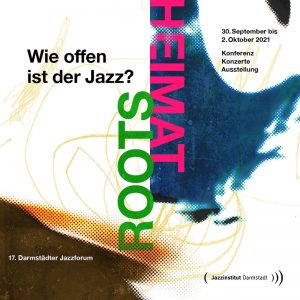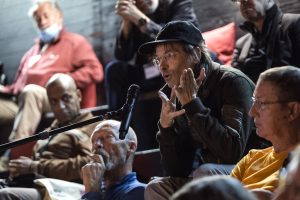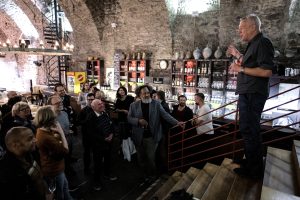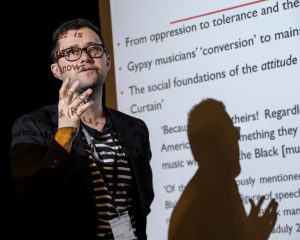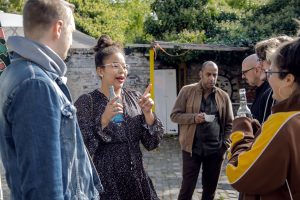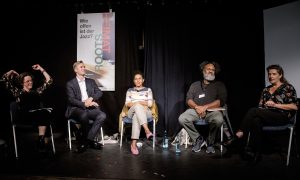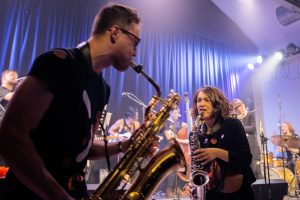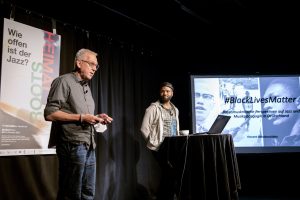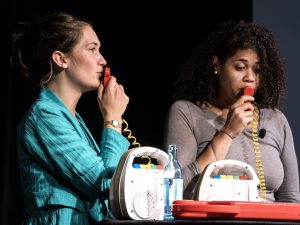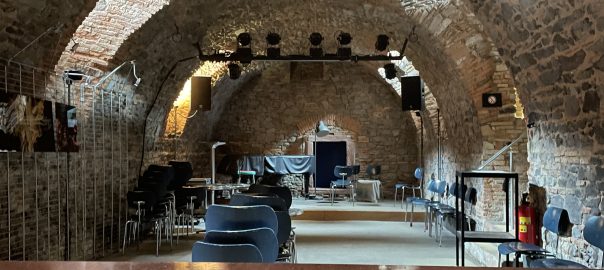Rabie Azar …
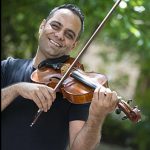 … war in Syrien acht Jahre lang Mitglied des Syrischen Nationalorchesters und des National Syrian Orchestra of Arabic Music sowie des Mediterranean Orchestra gewesen, bevor er dem syrischen Bürgerkrieg nach Deutschland entfloh. Von 2015 bis 2018 war der Bratschist Mitglied im Florida Lake Symphony Orchestra. Internationale Tourneen mit all diesen Orchestern führten ihn durch Europa und in die halbe arabische Welt.
… war in Syrien acht Jahre lang Mitglied des Syrischen Nationalorchesters und des National Syrian Orchestra of Arabic Music sowie des Mediterranean Orchestra gewesen, bevor er dem syrischen Bürgerkrieg nach Deutschland entfloh. Von 2015 bis 2018 war der Bratschist Mitglied im Florida Lake Symphony Orchestra. Internationale Tourneen mit all diesen Orchestern führten ihn durch Europa und in die halbe arabische Welt.
Foto: Imago/Bridges-Musikprojekt©
In seiner Heimat Syrien lehrte er parallel zu seinen Konzertengagements zunächst auch Violine und Viola an der Al Baath Universität in Homs sowie dem Sulhi al Wadi-Institut für Musik in Damaskus. Sein Studium hatte er 2005 am nationalen Musikkonservatorium von Damaskus abgeschlossen, wo er in klassisch-westlicher und in traditionell-orientalischer ebenso wie in zeitgenössischer populärer Musik ausgebildet wurde.
In Deutschland ist Rabie Azar u.a. Mitglied des Frankfurter „Bridges – Musik verbindet“-Kammerorchesters und lebt seit ein paar Jahren in Darmstadt. Neben zahlreichen Bühnenerfahrungen in sehr unterschiedlichen Kontexten während der letzten Jahre unterrichtet Azar auch im musikalischen Weiterbildungsprojekt Waggong e.V. in Frankfurt, wo er sein Wissen über die Fusion unterschiedlichster Musiktraditionen und deren vielfältigen Elementen der Improvisation an seine Schüler:innen weitergibt.
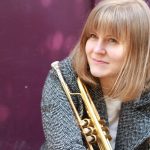 … hat in den letzten Jahren eine bemerkenswerte Karriere hingelegt, die sie in eine Reihe mit anderen jungen (sie ist Jahrgang 1987) europäischen Spitzen-Trompeterinnen wie Andrea Motis, Laura Jurd oder Airelle Besson stellt. Seit 2020 ist sie Resident des NICA-Artist Development Program im Kölner „Stadtgarten“. Heidi Bayer ist eine von drei Nominierten für den diesjährigen „Deutschen Jazzpreis“ in der Kategorie „Blechblasinstrumente“.
… hat in den letzten Jahren eine bemerkenswerte Karriere hingelegt, die sie in eine Reihe mit anderen jungen (sie ist Jahrgang 1987) europäischen Spitzen-Trompeterinnen wie Andrea Motis, Laura Jurd oder Airelle Besson stellt. Seit 2020 ist sie Resident des NICA-Artist Development Program im Kölner „Stadtgarten“. Heidi Bayer ist eine von drei Nominierten für den diesjährigen „Deutschen Jazzpreis“ in der Kategorie „Blechblasinstrumente“.
Foto: Franka Hills©
Bayer, die aus dem oberfränkischen Kulmbach stammt und ursprünglich mit der Klarinette begann, kam über die Schul-Bigband zur Trompete und zum Jazz, und wurde anschließend kulturell-musikalisch im Großraum Frankfurt sozialisiert. Einem Studium im Fach Kulturmanagement in Marburg schloss sich ein Bachelor in Jazz- und Popularmusik an der Hochschule für Musik in Mainz an, bevor es sie nach einem Auslandssemester in Miami endgültig in die Jazzmetropole Köln weiterzog und einen Masterstudiengang Jazz / Improvising Artist bei Ryan Carniaux und Thomas Rückert an der Folkwangschule in Essen folgen ließ.
In ihrer neuen Wahlheimat, in der Domstadt, mischte Bayer sich in die vielfältige Szene ein, zeigte Präsenz auf unzähligen Sessions und war schnell gefragt bei diversen großen und kleinen Bands, die das Spannungsverhältnis zwischen Freiheit und Struktur immer wieder anders ausbuchstabieren; in Bigbands wie dem Subway Jazz Orchestra, der Hendrika Entzian Bigband oder dem Fuchsthone Orchestra ebenso wie beispielsweise in den Bands von Janning Trumann, Shannon Barnett, Stefan Karl Schmid oder Sven Decker. In Darmstadt war sie zuletzt 2021 mit Luise Volkmanns LEONEsauvage zu hören.
Zunehmend fokussiert sich Bayer auf ihre eigenen Projekte, ihr Duo mit dem Pianisten Sebastian Scobel oder ihr Quartett Virtual Leak, dessen Debüt-CD im Frühjahr 2020 erschienen ist. Nicht nur als Instrumentalistin, sondern zunehmend auch als Bandleaderin, Arrangeurin und Komponistin erarbeitet sie sich den Zugriff auf die ganz große Palette der Klänge.
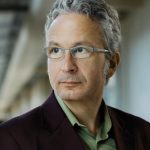
… ist seit den späten 1990er Jahren Stammgast in der illustren Riege der Lehrkräfte bei den Darmstädter Jazz Conceptions. Seitdem hat der gebürtige Darmstädter eine fantastische musikalische Karriere hingelegt, die ihm neben dem Musikpreis seiner Heimatstadt, den der Vibraphonist bereits 2005 erhielt, im vergangenen Jahr den „Deutschen Jazzpreis“ und in diesem Jahr auch noch den „Hessischen Jazzpreis 2022“ einbrachte.
Foto: Johanna Lippmann©
Aber nicht nur als improvisierender Musiker zählt Dell zu den herausragenden Protagonisten der Gegenwart, sondern auch als Stadtbautheoretiker, Philosoph und Architekturkritiker sind Dells Diskursbeiträge europaweit gefragt. Plan, Struktur, Komplexität, Information sind zentrale Begriffe im künstlerischen wie akademischen Kosmos Christopher Dells. Insbesondere mit seinen egalitären Trios D.R.A. (Dell/Ramond/Astor) und Dell/Lillinger/Westergaard verfolgt er diese musikalische Philosophie seit bald zwei Jahrzehnten konsequent. „Dell mag es schwierig, mag die Schwelle, den Widerstand. (…) Musikalische Forschung ohne Gefallsucht, das ist sein Metier“, schrieb Ulrich Stock in der ZEIT dazu.
Über seine Ideen für den diesjährigen Kurs sagt er folgendes:
„Ich werde mit den TeilnehmerInnen Materialien aus meinem Werkzyklus „Das Arbeitende Konzert/ The Working Concert“ erarbeiten.“
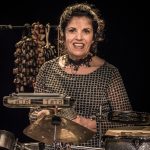 … fand 1993 den weiten Weg von Belo Horizonte ins beschauliche Rheinhessen. Die Tochter einer Musikerfamilie, die als Perkussionistin bereits in Brasilien mit vielen großen Namen aufgetreten war, fasste in Deutschland und Europa schnell in der vitalen Latin-Szene Fuß. Neben „ernsthaften“ musikalischen Projekten mit Airto Moreira, Paulo Cardoso, Edo Zanki oder dem auch kommerziell sehr erfolgreichen LatinJazz-Projekt Café del Mundo, sah man die Perkussionistin in vielen Fernsehshows an der Seite von Nina Hagen, Grace Jones, Lou Bega oder gelegentlich auch in der „Harald-Schmidt-Show“.
… fand 1993 den weiten Weg von Belo Horizonte ins beschauliche Rheinhessen. Die Tochter einer Musikerfamilie, die als Perkussionistin bereits in Brasilien mit vielen großen Namen aufgetreten war, fasste in Deutschland und Europa schnell in der vitalen Latin-Szene Fuß. Neben „ernsthaften“ musikalischen Projekten mit Airto Moreira, Paulo Cardoso, Edo Zanki oder dem auch kommerziell sehr erfolgreichen LatinJazz-Projekt Café del Mundo, sah man die Perkussionistin in vielen Fernsehshows an der Seite von Nina Hagen, Grace Jones, Lou Bega oder gelegentlich auch in der „Harald-Schmidt-Show“.
Foto: Seele Zeigen©
Ihre wohl bekannteste und dauerhafteste Zusammenarbeit mit dem Duo „Rosanna & Zélia“ brachte ihr viel internationale Aufmerksamkeit in der so genannten World Music-Szene der 90er und 00er-Jahre. Aber auch in der Jazzband Witchcraft um die Bassistin Lindy Huppertsberg oder der Frankfurter Frauen-Popband Kick La Luna fühlt sich Frontera in den letzten Jahren wohl. Vor allem ihre Vielseitigkeit als Perkussionistin, seltener am klassischen Schlagzeug-Set – wobei sie auch das beherrscht, wie sie nicht zuletzt auf Uli Partheils letzter Produktion „Reflections2020“ unter Beweis stellt – machen Angela Frontera zu einer äußerst gefragten und damit überaus Band-erfahrenen Musikerin.
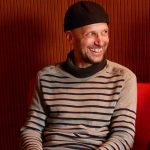 … ist seit 2021 künstlerischer Leiter der Darmstädter Jazz Conceptions und damit Nachfolger seines langjährigen musikalischen Mentors und Freundes Jürgen Wuchner. Partheil ist einer der aktivsten Protagonisten der Darmstädter Szene, beeinflusst von der Musik Duke Ellingtons, Thelonious Monks, kubanischen Rhythmen und dem Blues. Er ist nicht nur ein versierter Pianist in sämtlichen Stilistiken des Jazz, sondern auch als Komponist tätig. In seinen Kompositionen geht er äußerst kreativ mit den verschiedenen Einflüssen um, die ihn als Musiker prägen.
… ist seit 2021 künstlerischer Leiter der Darmstädter Jazz Conceptions und damit Nachfolger seines langjährigen musikalischen Mentors und Freundes Jürgen Wuchner. Partheil ist einer der aktivsten Protagonisten der Darmstädter Szene, beeinflusst von der Musik Duke Ellingtons, Thelonious Monks, kubanischen Rhythmen und dem Blues. Er ist nicht nur ein versierter Pianist in sämtlichen Stilistiken des Jazz, sondern auch als Komponist tätig. In seinen Kompositionen geht er äußerst kreativ mit den verschiedenen Einflüssen um, die ihn als Musiker prägen.
Foto: Oskar Partheil©
Uli Partheil studierte an der Mannheimer Musikhochschule unter anderem bei Professor Jörg Reiter Jazzpiano, außerdem Komposition und Arrangement. Seit Beginn der 1990er Jahre arbeitete er mit Jürgen Wuchner, Matthias Schubert, Janusz Stefanski, Ack van Rooyen, Rudi Mahall, Emil Mangelsdorff, Hanns Höhn, Peter Back, dem Wiener Kronenbräu Orchester und vielen anderen zusammen. Als Begleiter ist er auch immer wieder am Staatstheater Darmstadt zu hören. Bis zum Beginn der Pandemie leitete er das von ihm selbst ins Leben gerufene Darmstädter Jugendweltmusikorchester.
Mit seinem Working Trio „Playtime“ ist er in den letzten Jahren mit verschiedenen Literatur- & Jazz-Projekten erfolgreich. Zuletzt veröffentlichte er gemeinsam mit Ulli Jünemann, Ralf Cetto und Angela Frontera den Longplayer „Reflections2020“. Partheil unterrichtet an der Jazz & Pop School Darmstadt. Für seine musikalischen Verdienste und sein Wirken für die Förderung des jazzmusikalischen Nachwuchses erhielt er 2008 den Darmstädter Musikpreis.
Über seine Vorstellungen zum diesjährigen Workshop schreibt er folgendes:
„Ich möchte wieder versuchen mindestens ein Stück auswendig und ganzheitlich zu erarbeiten, d.h. die Musiker:innen sollen nicht nur ihren Part, sondern das ganze Werk lernen und verstehen. Dazu werde ich eigene Kompositionen und andere ausgewählte Stücke mitbringen.“
Christian Ramond …
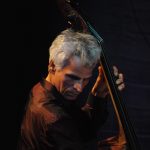 … hat sie alle begleitet: Joe Pass, Lee Konitz, Dave Liebman, Kenny Wheeler, Charlie Mariano, Thomas Stanko, Albert Mangelsdorf, Doug Rainey, Randy Brecker, Don Friedman, Philippe Catherine, Keith Copeland … eine nicht enden wollende Reihe großartiger Jazzmusiker. Und wahrscheinlich wäre die Reihe der Länder, in denen Ramond noch nicht aufgetreten ist weitaus kürzer als die Liste seiner internationalen Gastspiele. Hinzu kommen annähernd 100 Einspielungen auf CD oder Schallplatte.
… hat sie alle begleitet: Joe Pass, Lee Konitz, Dave Liebman, Kenny Wheeler, Charlie Mariano, Thomas Stanko, Albert Mangelsdorf, Doug Rainey, Randy Brecker, Don Friedman, Philippe Catherine, Keith Copeland … eine nicht enden wollende Reihe großartiger Jazzmusiker. Und wahrscheinlich wäre die Reihe der Länder, in denen Ramond noch nicht aufgetreten ist weitaus kürzer als die Liste seiner internationalen Gastspiele. Hinzu kommen annähernd 100 Einspielungen auf CD oder Schallplatte.
Foto: Christian Ramond©
Dieses enorme Lebenswerk liegt darin begründet, dass der in Bonn geborene Kontrabassist in allen Stilistiken des Jazz – von Swing bis zum freien Zusammenspiel – zuhause ist. Ramonds Spiel ist dabei nicht nur äußerst solide, sondern auch höchst wandlungsfähig – ohne seine eigene, charaktervolle Klangsprache zu verlieren, die mit Sicherheit auch in seinem Ensemble während der 31. Darmstädter Jazz Conceptions zum Tragen kommen wird.
Über seine Vorstellungen zum diesjährigen Workshop schreibt er folgendes:
„In meinem Ensemble möchte ich Kompositionen von drei Wegbereitern des modernen Jazz – Duke Ellington, Charles Mingus und Ornette Coleman – erarbeiten. Die lineare, harmonische und rhythmische Sprache des Jazz soll wie bei Mingus ergänzt werden durch freie Improvisation ,Kommunikation und kollektives Zusammenspiel. Material und Form der Improvisation soll gemeinsam entdeckt und erarbeitet werden und es besteht Offenheit für Ideen, gegebenenfalls eigene Stücke der Ensemblemitglieder.“
